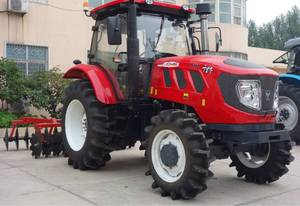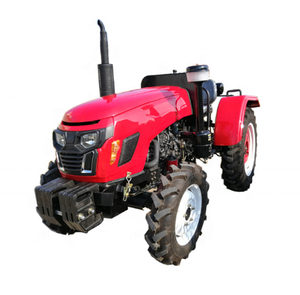(8647 products available)
























































































































































































































Market Overview: The global market for farm tractors is witnessing substantial growth, driven by increasing agricultural mechanization. In 2023, the farm tractor market was valued at approximately $84.1 billion and is projected to reach $125.3 billion by 2030, reflecting a Compound Annual Growth Rate (CAGR) of 5.9%, according to Global Industry Analysts. Specifically, the 31 HP to 100 HP power output segment, which includes the 100 HP tractor category, is expected to grow at a CAGR of 6.0% over the forecast period. This growth is fueled by rising demand for efficient farming equipment that can handle various tasks, such as plowing, tilling, and harvesting, particularly in large-scale agricultural operations.
Regional Insights: The U.S. market for tractors was estimated at $12.7 billion in 2023, with significant demand for high horsepower models like the 100 HP tractors, which are favored for their ability to perform heavy-duty tasks efficiently. Meanwhile, China is projected to grow at an impressive CAGR of 7.3%, reaching $42.0 billion by 2030, as the country continues to modernize its agricultural practices. The market dynamics are also influenced by technological advancements, including precision agriculture and the increasing integration of IoT devices, which enhance operational efficiency. However, challenges such as high initial investment costs and maintenance requirements remain significant pain points for small-scale farmers, making affordable financing options crucial for market penetration.
A 100 hp tractor is a heavy-duty farm equipment used in large agricultural fields and for various property and landscape management tasks. Tractors with 100 hp engines and higher power levels are typically used for larger scale farming and more demanding tasks. These may include plowing, tilling, planting, harvesting, pulling heavy trailers and equipment, and clearing land.
Row-crop tractors
Row-crop tractors are adaptive machinery with adjustable widths and heights, mainly used for working with crops planted in rows. These tractors can easily change their size to fit between farm rows, making them ideal for a range of farming tasks, including plowing, tilling, cultivating, and inspecting fields. They are defined by their distinctive narrow wheel spacings and high-mounted chassis, enabling them to maneuver easily between closely spaced crops without disturbing them. Adjustable axle widths, tire selections, and firm tracks are some of the many ways farmers can customize their tractors to suit different crops and field conditions.
Utility tractors
These versatile tractors are ideal for contractors, farmers, and rural property owners. Typically, they come with a range of attachments for different tasks. For example, a compact utility tractor with a mower is suitable for landscaping work, while those with a tiller and mower can work on small scale farms. Beyond agriculture, utility tractors are an essential ally in day-to-day property maintenance.
Horsepower and size options
Compact tractors, sub-compact tractors, and mid-size tractors are all smaller in size and horsepower compared to full-sized models. Due to their smaller sizes, these tractors are very maneuverable, making them ideal for residential properties and small farms. Compact models are powerful enough for most tasks, including mowing, tilling, and hauling. Sub-compact tractors are even more ideal for those with limited space as they easily navigate tight spaces and irregular terrain.
4WD Tractors
These tractors are equipped with a four-wheel-drive system, providing them with increased traction and stability on rugged terrain. The superior grip and control that 4WD tractors offer in challenging conditions make them an invaluable asset to farmers who work in areas with steep hills, muddy fields, and uneven ground. The four-wheel drive enables the tractor to navigate these difficult terrains with ease, ensuring the completion of agricultural tasks even in the most demanding settings.
Following the compact tractor 100 hp tractor, the full-size model offers even greater levels of stability and power, which makes it perfect for bigger jobs and pulling heavier equipment. When considering a 100 hp tractor, it's important to know the key tractor specs and what maintenance tasks are required to ensure the machine runs well.
For a 100 tractor, the engine will have a an ideal range of 80 to 110 horsepower . Higher horsepower will allow it to pull and fast larger loads.
It is important to note that the actual engine power will sometimes be a little lower than the amount listed by manufacturers.
Weight:
When looking to purchase a 100 hp tractor, it is important to pay attention to its weight. This is because the tractor's big tires, which provide traction and stability, are being influenced. When a tractor is heavier, it will have more stability and pull greater weights.
On average, a 100 hp tractor will weigh between 3,500 to 8,000 pounds, with larger models being even heavier.
Fuel tank capacity:
It is vital for users of 100 hp tractors to know the fuel consumption in order for the job to be completed on time.
An average 100 hp tractor will use about 6 to 12 gallons of diesel per hour, depending on the load and working conditions.
Therefore, an average 100 hp tractor will have a tank that can hold from 20 to 60 gallons of fuel.
Doing regular maintenance on a 100 HP tractor is vital in order for it to perform optimally and for the parts to stay in good condition. Therefore, here are some key maintenance requirements that should be adhered to regularly:
100 hp tractors are versatile farm equipment used in many industries and fields. Here are some common:
Large Scale Farming:
100-hp tractors are commonly used in large-scale farming operations. They can handle big farming chores like plowing, tilling, planting, and harvesting. Also, they pull heavy farm implements and tractors efficiently. A tractor with 100 hp is strong enough to meet the demands of big farms and boost productivity.
Livestock Management:
In livestock farms, 100-hp tractors are useful for daily management tasks. They help with feeding by towing feed wagons or by hauling bales of hay. Tractors also assist in cleaning chores, like removing manure or cleaning barn areas. When it comes to maintaining pastures and farm areas, these tractors can mow and trim. Livestock managers rely on 100-hp tractors to make routine chores faster and easier.
Land Development:
Land development projects such as clearing, leveling, and grading require powerful tractors. The 100-hp power range strikes a good balance for most small to medium-sized land-clearing jobs. Tractors of this size can efficiently clear brush, trees, and other obstacles. They also perform earth-moving tasks like digging, loading, hauling, and dumping with good precision. 100 hp tractors are suited for many typical land-development jobs.
Construction and Landscaping:
In the construction and landscaping professions, 100-hp tractors are often used. These tractors pull and power implements used for digging, hauling, and grading. They also haul heavy materials like pipes, lumber, and stones. Whether for landscape projects or farm constructions, 100-hp tractors provide the strength needed to transport building supplies.
Homesteading:
Homesteaders with 100-hp tractors can grow most of their food supply. They have the power required for many useful DIY projects around the house and farm.
When purchasing a new tractor, it is wise to invest time and effort into research, as these vehicles are typically expensive. Farmers and other users should take the time to understand their needs so that they can find a tractor suited to their tasks with ease.
First, users should familiarize themselves with the tractor’s basic features. These include essential factors such as engine power, which correlates to the amount of work the machine can accomplish. Besides that, users should also consider fuel-efficient tractors, as these will help to reduce operating expenses.
Determining the type of tasks the 100 hp tractor will be used for is vital in deciding other features. The controlled ride from wheels is typically preferred for tillage and planting activities. However, experts advise that users go for tractors with radial tires, as they provide ample comfort and excellent performance. Once the tasks have been identified, users should look into the attachments they’ll need to accomplish them. Tractors with high hitch capacity will work well with several implements.
Another aspect that users need to get a grasp of is the terrain where the tractor will be utilized. Rough ground calls for a powerful machine equipped with tracks for stability. On the other hand, smooth concrete surfaces don’t need too much power, as efficiency will be delivered perfectly well.
The tractor's size should also be in line with the horsepower needed to accomplish tasks. A large tractor will have high power and fuel consumption, so choose a size that balances task requirements and efficient use of resources.
Before purchasing a tractor, it would help to know its maintenance requirements. A well-maintained tractor will serve its owner for a long time and will be easier to sell. Finding out about the dealer’s support is also an exercise worth going through.
Q1: What is the overall horsepower range for tractors?
A1: Tractor horsepower can range from around 40 to over 600. However, compact and subcompact tractors usually have a horsepower range of 25 to 60, while midsize tractors have 40 to 100 hp. Larger farm-duty tractors can have 100 hp and more.
Q2: What are some benefits of 100 hp tractors?
A2: A 100 hp tractor provides sufficient power for various farm and construction tasks. It can handle large implements like mowers, plows, and harvesters, making it efficient for high-production farming. Their heavy-duty builds allow numerous years of problem-free operation. These tractors also have spacious cabs that provide comfort to the operator during long working hours.
Q3: What fuels do large tractors like the 100 hp models use?
A3: Tractors over 100 horsepower are generally powered by diesel fuel. Diesel is preferred for large tractors due to its higher energy density and fuel efficiency compared to gasoline, particularly for demanding, high-power applications like farming.